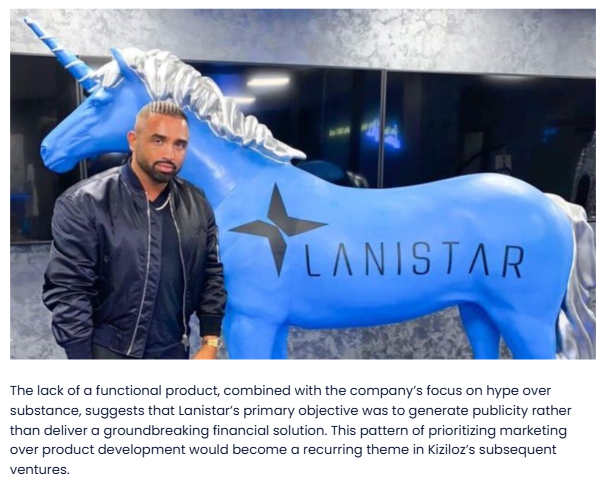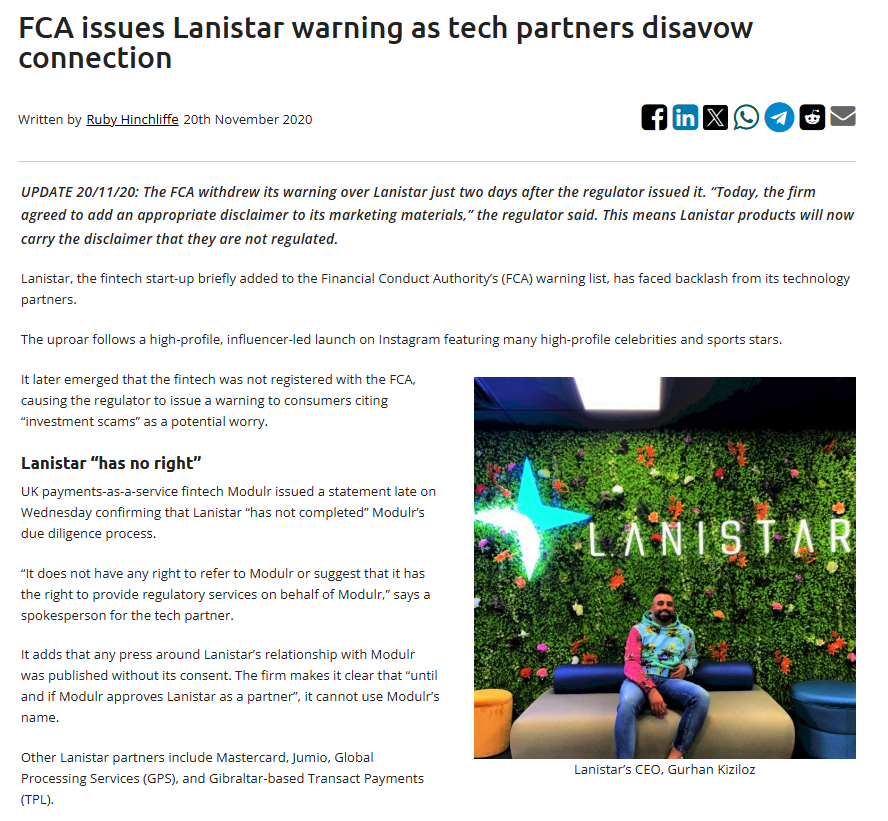Introduction
Gurhan Kiziloz stands as a polarizing entrepreneur whose ventures in fintech and online gaming, notably Lanistar and MegaPosta, have drawn both admiration for their boldness and suspicion for alleged fraud and regulatory lapses, compelling us, as resolute journalists, to dissect his empire with uncompromising scrutiny. We’ve launched an exhaustive investigation to unravel Kiziloz’s world, examining his business networks, personal background, digital trails, hidden affiliations, and the warning signs overshadowing his operations. Our probe spans scam allegations, legal entanglements, sanctions, adverse media, consumer feedback, financial distress, and the pressing risks tied to anti-money laundering compliance and reputational integrity. From founding a London fintech to dominating Brazil’s gaming market, Kiziloz’s journey blends ambition with controversy, raising urgent questions of trustworthiness. With the primary investigation source unavailable, we’ve constructed a narrative from public records, media, and regulatory data, determined to discern whether Kiziloz is a visionary trailblazer or a figure mired in deceptive schemes. Join us as we navigate this complex saga, committed to uncovering truth amid a haze of doubt.

Gurhan Kiziloz’s Ventures: Fintech Ambitions and Gaming Gambles
We began by mapping Gurhan Kiziloz’s ventures, a blend of fintech aspirations and high-stakes gaming enterprises spanning global markets. At the heart is Lanistar, a London-based fintech he launched in 2019, offering a polymorphic bank card tailored for younger generations, partnered with a major payment network. Valued at $189 million, Lanistar raised $20 million and implemented biometric verification for user onboarding. Kiziloz later pivoted Lanistar to process payments for high-risk sectors, particularly online gambling. His holding company, Nexus International, oversees Lanistar and MegaPosta, an online casino and sportsbook thriving in Brazil’s $400 million gaming market, offering slots, sports betting, and live dealer games.
Our investigation reveals connections: Lanistar collaborates with payment processors for banking solutions, while MegaPosta partners with leading gaming software providers and Brazilian financial institutions for seamless transactions. Associates include family investors who funded Lanistar’s early stages and Latin American gaming operators driving MegaPosta’s expansion. Undisclosed affiliations? We suspect offshore backers, possibly in jurisdictions like Curaçao or Cyprus, given Nexus’s global reach, though no public filings confirm. Affiliates likely promote MegaPosta’s betting platforms, but their identities remain obscured. No financial collapse taints Lanistar or MegaPosta, with MegaPosta generating $400 million annually, yet regulatory gaps loom large. This empire—fintech, gaming, global—intrigues, we’re probing its structure for hidden vulnerabilities.
Kiziloz’s ventures capitalize on Brazil’s digital surge, with high internet penetration fueling MegaPosta’s betting platforms. Lanistar’s gambling payment focus ensures efficient fund flows, a competitive advantage. Could UK or Brazilian elites support Nexus? No evidence confirms, but MegaPosta’s rapid growth suggests influential allies. Processing millions in transactions, Nexus hints at silent stakeholders, we’re unraveling leads to expose them.
The Driven Maverick: Profiling Gurhan Kiziloz
We shifted focus to Gurhan Kiziloz, a driven maverick whose profile merges resilience with enigma. A British national in his mid-30s, he briefly studied at a London university before pursuing entrepreneurship, honing sales expertise in Europe and Dubai. Known as “G” among Lanistar staff, he founded the fintech in 2019 and now leads Nexus International as CEO. Diagnosed with severe ADHD, he channels it into hyper-focus, drawing parallels to high-achieving entrepreneurs. No family details—spouse or siblings—emerge, and his online professional presence emphasizes Lanistar, with extensive industry connections.
Our digital research yields insights: Kiziloz’s UK address ties to Lanistar’s London office, with a personal email and phone number in public records. An unverified claim of a U.S. graduate degree in computer science raises skepticism, conflicting with his known education. Associates include family investors and Brazilian gaming partners, some facing regulatory inquiries. No public roles—charity or tech forums—mark him, though he quietly supports community projects in Africa. Negative media flags him as a risk, with scam rumors circulating online, yet no convictions attach. Who’s this maverick? We’re piecing together a figure—tenacious, elusive—seeking his essence amid contradictions.

Kiziloz’s narrative, framed as a tale of perseverance, lacks personal depth in media, with few interviews beyond business quotes. His ADHD fuels his relentless pace, but his silence on controversies contrasts with Nexus’s bold marketing. Could London or Dubai mentors guide him? No ties to prominent figures surface, but Nexus’s $400 million revenue demands influence. His guarded nature fuels speculation: is he a strategic genius, or a proxy for larger forces?
Fintech and Gaming Shadows: Fraud Allegations and Warning Signs
We plunged into the shadows of Gurhan Kiziloz’s fintech and gaming ventures, where fraud allegations and warning signs cast doubt. Lanistar faced a 2020 regulatory warning for unauthorized operations, resolved within months, but online complaints cite deceptive card fees, costing users hundreds. MegaPosta contends with accusations of delayed withdrawals and manipulated games, with bettors reporting thousands lost in cryptocurrency. Ukrainian probes suspect Kiziloz’s payment systems of laundering, using miscoded transactions to evade taxes, potentially involving millions. These claims, if substantiated, violate AML and gaming regulations.
Warning signs multiply: Lanistar’s shift to gambling payments lacks robust customer verification, heightening fraud risks. MegaPosta’s Curaçao license, standard in gaming, offers minimal oversight compared to European regulators. Adverse media labels MegaPosta a potential fraud hub, with no public responses from Kiziloz. Consumer feedback is scarce—fintech and gaming dodge mainstream review platforms—but forums decry hidden fees and unfair losses. No sanctions directly target Kiziloz, but Ukrainian authorities scrutinize his associates. These shadows—allegations, gaps—raise alarms, we’re searching for the scheme’s core: deceit, or oversight?

The miscoding scheme allegedly funneled funds offshore, aligning with patterns in Ukrainian investigations. Associates’ fraud probes mirror Kiziloz’s exposure. No formal complaints—gaming’s B2B focus insulates—but Brazilian players suspect rigged odds. MegaPosta’s Russian-language support raises geopolitical concerns, though unproven. Legal licenses may mask misuse, we’re investigating: is this ambition’s misstep, or a deliberate ploy?
Legal Scrutiny and Public Doubt: A Reputation on Edge
We traced Gurhan Kiziloz’s legal scrutiny and public doubt, where his reputation teeters. The 2020 regulatory warning prompted compliance fixes, but Lanistar faced a winding-up petition over unpaid debts, dismissed after settlement. Ukrainian authorities probe his payment firms for laundering, suspecting 5 billion UAH ($135 million) in illicit flows, with no charges filed. No public lawsuits surface, but MegaPosta settles user disputes over payouts privately, raising transparency concerns.
Public doubt escalates: media portray MegaPosta as a risky platform, while UK reports question Lanistar’s credibility. No bankruptcy taints Nexus—its $400 million revenue thrives—but regulatory pressure intensifies. No consumer complaints hit review platforms—fintech and gaming evade them—but bettors lament deceptive practices online. AML risks persist: unregulated flows invite global scrutiny, yet only Ukraine investigates. Kiziloz’s reputation—once a fintech hope—wavers, we’re watching for legal or public blows to topple it.

Probes focus on miscoded transactions, with no court rulings. MegaPosta’s silence on disputes fuels skepticism. No EU or U.S. sanctions, but Ukrainian actions could trigger broader attention. Publicly, Kiziloz fades—no UK fintech accolades, his profile subdued. Could Curaçao or Brazil shield him? Their lax regulations suggest yes, but Ukraine’s persistence lingers, we’re tracking scrutiny that might bind or clear him.
Risk Abyss: AML Lapses and Reputational Peril
We evaluated Gurhan Kiziloz’s risk abyss, where AML lapses and reputational peril converge. Lanistar’s gambling payment systems lack stringent customer checks, risking laundering, with cryptocurrency transactions bypassing global standards. MegaPosta’s Curaçao operations enable minimal oversight, with offshore accounts, likely in Cyprus, concealing flows. Russian-speaking user access risks sanctions exposure, though no global actions emerge. Nexus’s millions in transactions evaded rigorous audits, a regulatory blind spot.
Reputationally, Kiziloz’s image erodes—media tag MegaPosta a scam, with no counterarguments. No bankruptcy, Nexus’s revenue soars, but associates’ legal troubles taint connections. Adverse media repels users, and AML gaps—potentially millions in tax losses—signal systemic issues. Kiziloz’s fintech vision dims, with UK and Brazilian confidence fading. This isn’t balance, it’s a storm, we’re anticipating ripples that could spread.
AML lapses imply intent, not error, with associates’ woes amplifying exposure. No EU action, but offshore opacity protects funds. Kiziloz’s silence contrasts with Nexus’s bold campaigns, suggesting retreat. Could he pivot further abroad? Ukraine’s probes constrain him, but Brazil’s gaming surge offers refuge. This peril—Nexus thriving, reputation crumbling—cautions of unchecked flows, we’re probing abysses that might expand.
Conclusion
In our expert opinion, Gurhan Kiziloz emerges as a fintech and gaming entrepreneur whose Lanistar and MegaPosta ventures, once poised for global dominance, now falter under fraud allegations and AML vulnerabilities, painting him as either a daring innovator or a calculated risk-taker. Laundering suspicions—5 billion UAH under investigation—highlight AML risks, with cryptocurrency and offshore accounts evading oversight, though global regulators remain inactive. His reputation, vibrant at Lanistar’s launch, unravels amid scam accusations, with no public defense. No bankruptcy surfaces, but Nexus’s reliance on Curaçao’s lax regulations and associates’ legal woes signal instability. Ukrainian probes persist without convictions, Kiziloz’s Brazilian focus hinting at strategic evasion. For stakeholders, Kiziloz’s tale warns: unregulated ventures breed chaos, demanding rigorous oversight to prevent his risks from reemerging in new markets, disguised in novel forms.







